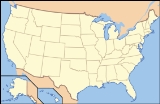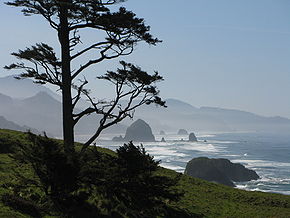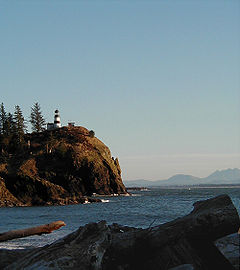
Lewis and Clark National and State Historical Parks
Encyclopedia
The Lewis and Clark National and State Historical Parks, in the vicinity of the mouth of the Columbia River
, commemorate the Lewis and Clark Expedition
. Administration of the parks is a cooperative effort of the United States
National Park Service
and the states of Oregon
and Washington, and was dedicated on November 12, 2004.
After reaching the Pacific Ocean
, the Corps of Discovery camped at Fort Clatsop
in the winter of 1805–1806. The parks also preserve several landing sites on the north bank of the river in Washington, and other sites in Oregon.
on October 15, 1966. On October 30, 2004, it was redesignated Lewis and Clark National Historical Park with expanded jurisdiction over multiple sites, including:

and the Needles are visible in from many sites in the park. Much of the 1985 film The Goonies
was filmed there, and the final scenes of the 1991 film Point Break
were filmed at Indian Beach in the park.
, with its 3700 acres (1,497.3 ha) park, offers exploration of history, nature, and recreational opportunities. The fort was the primary military defense installation in the three fort Harbor Defense System at the mouth of the Columbia River (Fort Canby and Fort Columbia were other two).

, formerly known as Fort Canby State Park, is a 1882 acres (761.6 ha) camping park on the Long Beach Peninsula, fronted by the Pacific Ocean. The park offers 27 miles (43 km) of ocean beach, two lighthouses, an interpretive center and hiking trails. The Cape Disappointment Historic District was listed on the National Register on August 15, 1975.
post along the north side of the Columbia river outlet. At 593 acres (240 ha), the park includes an interpretive center focused on the fort and regional history.
Chinook Point
, the site from which an American captain, Robert Gray, first saw the Columbia River, is part of the park. His explorations gave the United States a strong position in its later territorial contests with Great Britain
. Chinook Point
was named a National Historic Landmark
in 1961.
Columbia River
The Columbia River is the largest river in the Pacific Northwest region of North America. The river rises in the Rocky Mountains of British Columbia, Canada, flows northwest and then south into the U.S. state of Washington, then turns west to form most of the border between Washington and the state...
, commemorate the Lewis and Clark Expedition
Lewis and Clark Expedition
The Lewis and Clark Expedition, or ″Corps of Discovery Expedition" was the first transcontinental expedition to the Pacific Coast by the United States. Commissioned by President Thomas Jefferson and led by two Virginia-born veterans of Indian wars in the Ohio Valley, Meriwether Lewis and William...
. Administration of the parks is a cooperative effort of the United States
United States
The United States of America is a federal constitutional republic comprising fifty states and a federal district...
National Park Service
National Park Service
The National Park Service is the U.S. federal agency that manages all national parks, many national monuments, and other conservation and historical properties with various title designations...
and the states of Oregon
Oregon
Oregon is a state in the Pacific Northwest region of the United States. It is located on the Pacific coast, with Washington to the north, California to the south, Nevada on the southeast and Idaho to the east. The Columbia and Snake rivers delineate much of Oregon's northern and eastern...
and Washington, and was dedicated on November 12, 2004.
After reaching the Pacific Ocean
Pacific Ocean
The Pacific Ocean is the largest of the Earth's oceanic divisions. It extends from the Arctic in the north to the Southern Ocean in the south, bounded by Asia and Australia in the west, and the Americas in the east.At 165.2 million square kilometres in area, this largest division of the World...
, the Corps of Discovery camped at Fort Clatsop
Fort Clatsop
Fort Clatsop was the encampment of the Lewis and Clark Expedition in the Oregon Country near the mouth of the Columbia River during the winter of 1805-1806...
in the winter of 1805–1806. The parks also preserve several landing sites on the north bank of the river in Washington, and other sites in Oregon.
Lewis and Clark National Historical Park
The federal park began as Fort Clatsop National Memorial which was established on May 29, 1958. The memorial was listed on the National Register of Historic PlacesNational Register of Historic Places
The National Register of Historic Places is the United States government's official list of districts, sites, buildings, structures, and objects deemed worthy of preservation...
on October 15, 1966. On October 30, 2004, it was redesignated Lewis and Clark National Historical Park with expanded jurisdiction over multiple sites, including:
- Clark's Dismal Nitch
- Fort ClatsopFort ClatsopFort Clatsop was the encampment of the Lewis and Clark Expedition in the Oregon Country near the mouth of the Columbia River during the winter of 1805-1806...
- Fort to Sea Trail (dedicated on November 14, 2005)
- Memorial to Thomas Jefferson
- Netul Landing
- Salt Works
- Station Camp
Oregon state parks

Ecola State Park
Ecola was the site of the Corps of Discovery's 1806 trek over difficult terrain to see a beached whale. Today, it features several miles of hiking trails through old growth forest, and several beaches. Haystack RockHaystack Rock
Haystack Rock is a 235-foot sea stack in Cannon Beach, Oregon. It is sometimes claimed locally to be the third-tallest such "intertidal" structure in the world, but there are no scientific references to support this. A popular tourist destination, the monolithic rock is adjacent to the beach and...
and the Needles are visible in from many sites in the park. Much of the 1985 film The Goonies
The Goonies
The Goonies is a 1985 American adventure-comedy film directed by Richard Donner. The screenplay was written by Chris Columbus from a story by executive producer Steven Spielberg. The premise surrounds a band of pre-teens who live in the "Goon Docks" neighborhood of Astoria, Oregon hoping to save...
was filmed there, and the final scenes of the 1991 film Point Break
Point Break
Point Break is a 1991 action film directed by Kathryn Bigelow and starring Patrick Swayze, Keanu Reeves, Lori Petty and Gary Busey. The title refers to the surfing term point break, where a wave breaks as it hits a point of land jutting out from the coastline.The film was a box office success upon...
were filmed at Indian Beach in the park.
Fort Stevens State Park
Fort StevensFort Stevens (Oregon)
Fort Stevens was an American military installation that guarded the mouth of the Columbia River in the state of Oregon. Built near the end of the American Civil War, it was named for slain Civil War general and former Washington Territory governor, Isaac Stevens. The fort was an active military...
, with its 3700 acres (1,497.3 ha) park, offers exploration of history, nature, and recreational opportunities. The fort was the primary military defense installation in the three fort Harbor Defense System at the mouth of the Columbia River (Fort Canby and Fort Columbia were other two).
Sunset Beach State Recreation Area
Sunset Beach is the terminus of the Fort To Sea Trail, which begins in Fort Clatsop. Sunset Beach also provides visitors with direct access to the Pacific Ocean with expansive views from Cape Disappointment to the north and Ecola State Park to the South.Washington state parks

Cape Disappointment State Park
Cape DisappointmentCape Disappointment (Washington)
Cape Disappointment is a headland located at the extreme southwestern corner of Washington State on the north side of the Columbia River bar, at . The point of the cape is located on the Pacific Ocean in Pacific County, approximately two miles southwest of the town of Ilwaco...
, formerly known as Fort Canby State Park, is a 1882 acres (761.6 ha) camping park on the Long Beach Peninsula, fronted by the Pacific Ocean. The park offers 27 miles (43 km) of ocean beach, two lighthouses, an interpretive center and hiking trails. The Cape Disappointment Historic District was listed on the National Register on August 15, 1975.
Fort Columbia State Park
Fort Columbia is an old coastal artilleryArtillery
Originally applied to any group of infantry primarily armed with projectile weapons, artillery has over time become limited in meaning to refer only to those engines of war that operate by projection of munitions far beyond the range of effect of personal weapons...
post along the north side of the Columbia river outlet. At 593 acres (240 ha), the park includes an interpretive center focused on the fort and regional history.
Chinook Point
Chinook Point
Chinook Point is a headland in Pacific County, Washington. Captain Robert Gray, the first non-native to enter the Columbia River, saw the river from Chinook Point in 1792...
, the site from which an American captain, Robert Gray, first saw the Columbia River, is part of the park. His explorations gave the United States a strong position in its later territorial contests with Great Britain
Great Britain
Great Britain or Britain is an island situated to the northwest of Continental Europe. It is the ninth largest island in the world, and the largest European island, as well as the largest of the British Isles...
. Chinook Point
Chinook Point
Chinook Point is a headland in Pacific County, Washington. Captain Robert Gray, the first non-native to enter the Columbia River, saw the river from Chinook Point in 1792...
was named a National Historic Landmark
National Historic Landmark
A National Historic Landmark is a building, site, structure, object, or district, that is officially recognized by the United States government for its historical significance...
in 1961.

